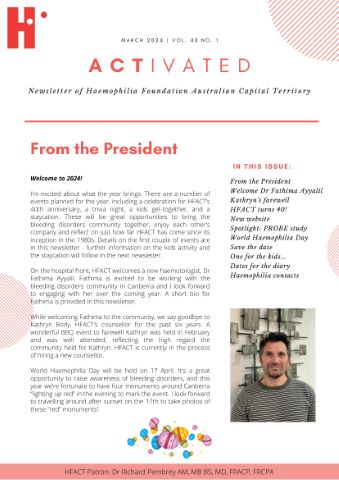
David is an Australian community member. He spoke with Suzanne O’Callaghan from HFA about his experience of treatment with one of the new hepatitis C direct acting antiviral (DAA) regimes
David has von Willebrand disorder. Like many people with mild bleeding disorders who have only had the occasional blood product treatment, he never really thought that he might have been at risk of infection with hepatitis C virus from his treatment. New safety precautions for blood products were introduced in the early 1990s and after a few years the issue of hepatitis C for people who used blood products before 1990 no longer made news in the media. For David, it was off the radar.
David was feeling fine. He didn’t even know he had hepatitis C. By co-incidence he underwent a series of tests for another health problem and it was then that his doctors found that he had hepatitis C. On reflection, David realised that he probably acquired hepatitis C in the early 1980s.
“I went for about 20, 30 years without even knowing,”
he said.
His Haemophilia Centre made a referral for him to visit the hepatitis specialist at the liver clinic. They wanted to check how his liver health was going with his hepatitis C.
“They looked at my liver by ultrasound and they saw I had a bumpy looking liver, like cirrhosis of the liver,” said David. “The specialist wanted me to go on treatment, but this was the 12 month treatment with a lot of side-effects. So I told her that it wouldn’t be for me.”
GOING ON TREATMENT
Fortunately for David, the liver clinic was able to organise access to Viekira Pak ®, one of the new direct acting antiviral (DAA) treatments, which was not yet available on the Pharmaceutical Benefits Scheme but provided by the pharmaceutical company under an early access scheme.
David had a treatment program worked out for him that took his cirrhosis into account. This meant he would need to take about 12 tablets a day for 24 weeks – 6 months. David lives in a regional town, a few hours away from the hospital.
“I had to go down and see the hepatitis nurse practitioner and the hepatitis specialist every month, and I had to collect the medication at the hospital pharmacy,” remembered David. “I had to have blood tests every month, but I had them done in my own town and they sent the results to the hospital. So I had to travel to the hospital about 8 times altogether – and it’s not really that bad.”
In between the visits the hepatitis nurse practitioner and David kept in contact by phone, especially if she noticed changes in his blood results or he became aware of side-effects.
“For a little while the haemoglobin wasn’t exactly what the nurse practitioner wanted, so she monitored it very closely and I had to have blood tests every two weeks just for a bit, and sometimes had to adjust the dose of one of my tablets. I was worried that the treatment wouldn’t work but she reassured me that I could afford to reduce the dose for a little while without risking a cure,” he commented. “For 4 months I went straight through with no problems at all, but then I started turning a yellowish colour, which they had to sort out. I didn’t want to say anything about it, in case they stopped the treatment, but my wife knew better! That was the only side-effect I had over the whole treatment.”
Twelve weeks after treatment, David had another blood test (a Hepatitis C RNA Viral Load) and visited the hepatitis specialist, who told him he had successfully cleared the virus.
“I feel a lot better knowing I don’t have hepatitis C anymore,” David said. “I’m going to be around a bit longer!”
AND FOR THE FUTURE?
Because he had already developed cirrhosis, David will need to have liver health checks regularly for the rest of his life to monitor his liver health and keep an eye out for signs of advancing liver disease or complications which can be managed.
His tips for other people with bleeding disorders and hepatitis C?
“Just do treatment. They are so much better now. Don’t even hesitate.
“And if you don’t know if you have hep C, get tested. It was just a fluke thing that I found out. But if I had known earlier that I had hep C, I probably wouldn’t have cirrhosis of the liver because I could have had it treated back years ago.


